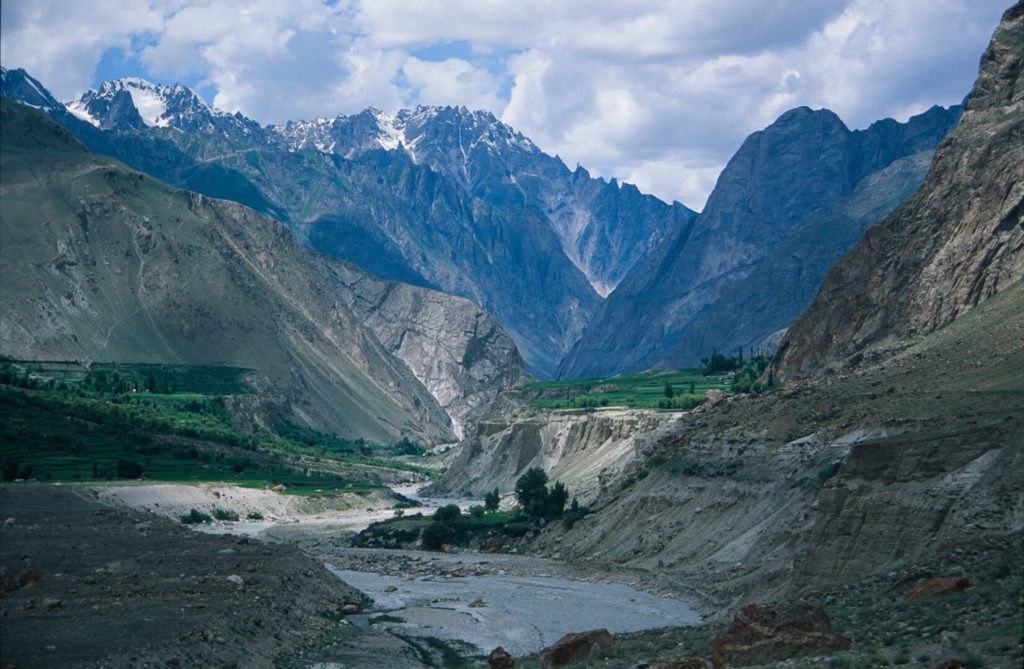
Ayub Khan was born and raised in a remote village in Gilgit-Baltistan, the ‘Jewel of Pakistan’ – a spectacular region surrounded by snow-capped mountains and turquoise lakes. Now a popular destination for mountaineers and trekkers, the glaciers found in the Northern Mountain range of Hindu Kush and Karakoram are almost the largest in the world.
After his studies, Ayub started work in tourism, wishing to share his love of his beautiful country, enabling tourists to experience the Karakoram mountains and, hopefully, to change their perceptions of Pakistan and his fellow countrymen. He travelled extensively, working as a guide for Hindu Kush Trails based in Chitral. They pioneered some of the best trekking routes in the world, and were the first to promote tourism to English-speaking tourists.
Ayub’s other areas of expertise included mountaineering, cultural history, art, architecture, archaeology and photography, and in 2009 he started his charity work. At the time the conflict with the Taliban had led to eight million civilians being displaced, gathering in the Jalozai refugee camp in Charsada, in Peshawar. In a hot summer Ayub visited twice, travelling 800km from Gilgit, to see how he could help. He appealed to his trekking friends to assist displaced families and several contributed financially. They managed to assist several families from Waziristan, Bajwur and Swat. This was his first experience of charitable work.
In 2010 Ayub was leading a trek to K2 base camp, travelling to Islamabad to greet clients at the airport. The Karakoram Highway became blocked because of landslides. Many bridges were completely washed away, and they were stuck. Eventually rescued by military helicopter, they were able to continue the journey but en route to Skardu they learnt that Pakistan was totally under water with destruction everywhere.
After the trek, Ayub assisted flood-displaced victims in the vicinity of Dain Ishkoman and appealed to trekking friends again for donations for the flood victims. He worked in remote areas of Ghizer District and the Darkot village of Yasin which was badly destroyed, helping many displaced families. The Juniper Trust contributed a generous donation to help Ayub purchase warm bedding and clothing to provide relief aid to over a hundred families.


In 2011 Ayub had been on a visit to the remote neglected community of Shadri, a village in Asumbar, in the Ishkoman Valley, where several Gujjar families had settled. There was no school building and Ayub was approached by the community to assist in constructing a school. He contacted The Juniper Trust and they agreed to support the building project, the plot of land being donated by the community. In 2011, following the floods, £8000 was raised by The Juniper Trust to fund the building of the new school in Asumbar. It took two years to construct because of its remote location. Materials such as cement and sand were difficult to deliver. The local Deputy Commissioner and Deputy Education Director both praised JT services for supporting this remote community.
Ayub supervised the works, and the school was finally completed in spring 2013, its aim being to teach boys and girls from the village, as well as children from nearby villages. Since the opening of the school, The Juniper Trust have continued to support the salary of a teacher and provided uniforms and equipment for all 20 children, some of whom have progressed to secondary education.
Neglected by the authorities and impacted by the dramatic reduction in tourism in the area due to Covid, Shadri School still strives to provide an education for the 20+ local children, but they desperately need outside help to keep going. Ayub has made regular visits to Asumbar Village, most recently in October 2022 to deliver more uniforms, books, and equipment to Shadri School. During this visit, he was approached by the headmaster of Asumbar Primary School and agreed to sponsor two volunteer female teachers for £20 a month each year, as there were no funds available to pay them. The Juniper Trust currently needs to raise just £1,500 a year to support three teachers and replace uniforms and school equipment at Shadri School. JT are also looking at options for teacher training to help the school improve its success rate for graduation to secondary school.



In January 2021, during a catch-up with a headmaster in Askole, Ayub asked what the village needed most. The answer was a surprise – “FOOD!” Incredible as it may seem, people in the village were starving – with no income from tourism, families simply could not afford to feed themselves.
The Juniper Trust put on hold a plan to buy winter jackets for the school children and sent £1,200 to allow a team of volunteers, led by Ayub, to deliver a month’s supply of basic food ingredients – two jeep loads of flour, rice, dahl, sugar, tea and soap – to the 40 worst-off families in Askole. It was no mean feat in the winter conditions. Each food parcel cost just £30, including delivery costs, subsidised by local suppliers keen to help. Choosing the families for assistance was the most difficult part as there were many who were deserving. However, this was done fairly by the village elders.
The gratitude from the villagers was overwhelming. Word soon spread about the relief, prompting two more villages in the remote Valley of Hushe to ask for help too. Despite their limited funds, The Juniper Trust decided to be ambitious and sent a further £2,500 to deliver 100 food parcels, 50 each to the villages of Khande and Hushe itself.
Ayub Khan continues to this day to give his time tirelessly and voluntarily to help The Juniper Trust. He has participated in many charity walks to raise donations, including an amazing barefoot climb in traditional dress to the top of England’s highest mountain, Scafell Pike, and the London Bridges Challenge.
30 Wordsworth Street
Penrith, Cumbria
CA11 7QY, United Kingdom
Registered Charity Number: 1053356